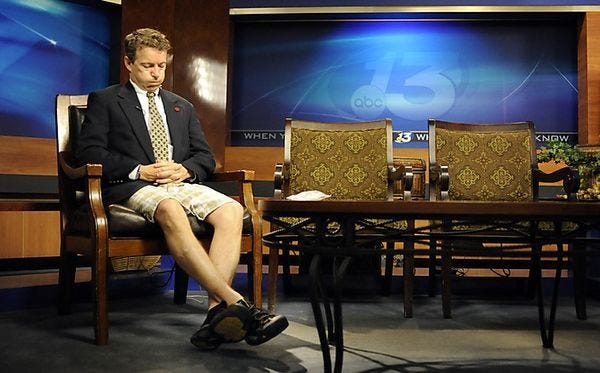Rand Paul Says Hard Work And Tax Cuts Will Make Everyone Rich, Especially The Rich
On "Fox News Sunday" (on Fox News, Sunday), Rand Paul offered some inspiring thoughts on how the economy really works, based purely on the theories of Ayn Rand plus multiple massive bong hits: Tax rates have nothing to do with who gets wealthy in America. Rather, wealth is simply an indicator of how good you are at doing capitalism to other people. Paul rejected the idea that economic policy has any effect on who wins and who loses in the economy, which will certainly come as news to the army of corporate lobbyists who've been writing our great nation's tax code since the Reagan era.
"The thing is, income inequality is due to some people working harder and selling more things," Paul told host Chris Wallace on "Fox News Sunday." "If people voluntarily buy more of your stuff, you'll have more money."
The Kentucky senator then went on to explain that the race always goes to the swift, the battle to the strong, bread to the wise, favor to men of skill, and riches to men of understanding -- and then he pointed both thumbs to his chest and mouthed "this guy."
Paul came out with his flabbergasting lie as part of his pitch for a flat tax rate, which the Tax Foundation notes would increase the after-tax income of households earning more than $1 million per year by a full 13 percent, and would add 3 percent to the incomes of households making between $50,000 and $75,000. Oh, and as a bonus, it would slash government revenues by $3 trillion over 10 years, which wouldn't be a problem because everyone would become rich if they worked real hard and voluntarily bought each other's stuff, so we wouldn't need to pay for welfare or disability or other wasteful things like that, probably. And the national debt would already have been eliminated by defunding Planned Parenthood.
[contextly_sidebar id="WmAU3m8uQBFANwwAGoATfl20dAbqmQMv"]
In an attempt to take Paul seriously, host Chris Wallace asked, "Doesn't your plan massively increase income inequality?" Paul, undaunted, explained how economies work in his grand libertarian dreamworld:
"It's a fallacious notion to say, 'Oh, rich people get more money back in a tax cut,'" Paul responded. "If you cut taxes 10 percent, 10 percent of a million is more than 10 percent of a thousand dollars. So, obviously, people who pay more in taxes will get more back."
"We all end up working for people who are more successful than us," Paul went on, "and that's a good thing, that more money will be back in the economy."
And everyone will eventually benefit, especially once we get rid of burdensome regulations that keep people from working as long as they want to for as little pay as they can sell their labor for. And we won't need government, since people can simply rate their Uber drivers and the Free Market will work its magic.
[contextly_sidebar id="v1XfdpTf6hPsmikCfG48ZRjoaaUR2m8L"]
Asked for comment, the ghost of Horatio Alger said he found Paul's economic ideas "a bit of a stretch."
[ HuffPo ]




So how was your "Tom Russell Radio?" I actually prefer mostly his older stuff, but all of it is pretty good (Long Way Around, Borderland my favorite albums).
You stated perfect competition is not possible. I agree, and I can assure you that Rand Paul has never voiced any support for the notion of "perfect competition." The concept is actually opposed by the economists who Paul shares views with. Market economists realize that the old static models of market equilibrium do not functionally describe the real world dynamism of the market.
In reality, it is government antitrust regulators who base economic policy on the incorrect notion that markets do not perform well with information asymmetries, and devote their efforts to the futile task of "correcting" these asymmetries and creating "perfect competition."
The consequences, of course, with doing away with this "perfect competition" model means doing away with the antitrust regulators. So go ahead, lead the fight against this erroneous economic notion. I'm right behind you.